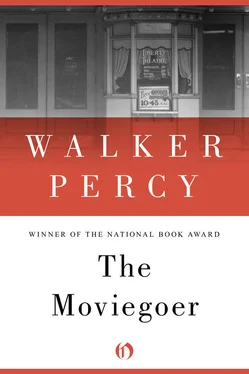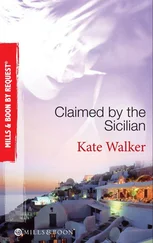“Emily, do you remember the night we saw There Shall Be No Night and you were so moved that you insisted on walking all the way back to the Carlyle?”
But Kate pays no attention. She holds her feathered thumb to the light and inspects it minutely. “Last night everything was fine until I finished the book. Then it became a matter of waiting. What next, I thought. I began to get a little scared — for the first time I had the feeling of coming to the end of my rope. I became aware of my own breathing. Things began to slip a little. I fixed myself a little drink and took two nembutals and waited for the lift.”
It is the first time she has spoken of her capsules. My simplemindedness serves her well.
“You know what happened then? What did Sam say? Never mind. Did you see Merle? No? Hm. What happened was the most trivial thing imaginable, nothing grand at all, though I would like to think it was. I took six or eight capsules altogether. I knew that wouldn’t kill me. My Lord, I didn’t want to die — not at that moment. I only wanted to — break out, or off, off dead center — Listen. Isn’t it true that the only happy men are wounded men? Admit it! Isn’t that the truth?” She breaks off and goes off into a fit of yawning. “I felt so queer. Everything seemed so — no ’count somehow, you know?” She swings her foot and hums a little tune. “To tell you the truth, I can’t remember too well. How strange. I’ve always remembered every little thing.”
“—and you spoke to me for the first time of your messianic hopes?” Sam smiles at my aunt. In Feliciana we used to speculate on the new messiah, the scientist-philosopher-mystic who would come striding through the ruins with the Gita in one hand and a Geiger counter in the other. But today Sam miscalculates. My aunt says nothing. The thumbnail goes on combing the lion’s mane.
Dinner over, Uncle Oscar waits in the dining room until the others have left, then seizes his scrotum and gives his leg a good shake.
I rise unsteadily, sleepy all at once to the point of drunkenness.
“Wait.” Kate takes my arm urgently in both hands. “I am going with you.”
“All right. But first I think I’ll take a little nap on the porch.”
“I mean to Chicago.”
“Chicago?”
“Yes. Do you mind if I go?”
“No.”
“When are you leaving?”
“Tomorrow morning.”
“Could you change it to tonight and get two tickets on the train?”
“Why the train?” I begin to realize how little I have slept during the past week.
“I’ll tell you what. You go lie down and I’ll take care of it.”
“All right.”
“After Chicago do you think there is a possibility we might take a trip out west and stay for a while in some little town like Modesto or Fresno?”
“It is possible.”
“I’ll fix everything.” She sounds very happy. “Do you have any money?”
“Yes.”
“Give it to me.”
It is a matter for astonishment, I think drowsily in the hammock, that Kate should act with such dispatch — out she came, heels popping, arm in arm with her stepmother, snapped her purse and with Sam looking on, somewhat gloomily it struck me, off she went in her stiff little Plymouth — and then I think why. It is trains. When it comes to a trip, to the plain business of going, just stepping up into the Pullman and gliding out of town of an evening, she is as swift and remorseless as Delia Street.
Now later, on Prytania, Uncle Oscar hands Aunt Edna into the station wagon — they are bound for their Patio-by-Candlelight tour — and goes huffing around to his door, rared back and with one hand pressed into his side. Sam tiptoes to the screen. “Well now look ahere, Brother Andy. Ain’t that the Kingfish and Madame Queen? Sho ’tis.”
In this vertigo of exhaustion, laughter must be guarded against like retching.
“Brother Andy, is you getting much?”
“No.” My stomach further obliges Sam with a last despairing heave. Oh Lord.
Later there seems to come into my hand — and with it some instructions from Sam of which there is no more to be remembered than that they were delivered in the tone of one of my aunt’s grand therapeutic schemes — a squarish bottle, warmed by Sam’s body and known to my fingers through the ridge of glass left by the mold and the apothecary symbol oz or 
2
SURE ENOUGH, THREE hours later we are rocking along an uneven roadbed through the heart of the Ponchitoula swamp.
No sooner do we open the heavy door of Sieur Iberville and enter the steel corridor with its gelid hush and the stray voices from open compartments and the dark smell of going high in the nostrils — than the last ten years of my life take on the shadowy aspect of a sojourn between train rides. It was ten years ago that I last rode a train, from San Francisco to New Orleans, and so ten years since I last enjoyed the peculiar gnosis of trains, stood on the eminence from which there is revealed both the sorry litter of the past and the future bright and simple as can be, and the going itself, one’s privileged progress through the world. But trains have changed. Gone are the uppers and lowers, partitions and cranks, and the green velour; only the porter remains, the same man, I think, a black man with palms the color of shrimp and a neck swollen with dislike. Our roomettes turn out to be little coffins for a single person. From time to time, I notice, people in roomettes stick their heads out into the corridor for some sight of human kind.
Kate is affected by the peculiar dispensation of trains. Her gray jacket comes just short of her wide hips and the tight skirt curves under her in a nice play on vulgarity. On the way to the observation car she pulls me into the platform of the vestibule and gives me a kiss, grabbing me under the coat like a waitress. In celebration of Mardi Gras, she has made up her eyes with a sparkle of mascara and now she looks up at me with a black spiky look.
“Are we going to live in Modesto?”
“Sure,” I say, uneasy at her playfulness. She is not as well as she makes out. She is not safe on a train after all; it is rather that by a kind of bravado she can skim along in the very face of the danger.
The observation car is crowded, but we find seats together on a sofa where I am jammed against a fellow reading a newspaper. We glide through the cottages of Carrollton cutting off back yards in odd trapezoids, then through the country clubs and cemeteries of Metaire. In the gathering dusk the cemeteries look at first like cities, with their rows of white vaults, some two- and three-storied and forming flats and tenements, and the tiny streets and corners and curbs and even plots of lawn, all of such a proportion that in the very instant of being mistaken and from the eye’s own necessity, they set themselves off into the distance like a city seen from far away. Now in the suburbs we ride at a witch’s level above the gravelly roofs.
It gradually forces itself upon me that a man across the aisle is looking at me with a strange insistence. Kate nudges me. It is Sidney Gross and his wife, beyond a doubt bound also for the convention. The son of Sidney Gross of Danziger and Gross, Sidney is a short fresh-faced crinkle-haired boy with the bright beamish look Southern Jews sometimes have. There has always been a special cordiality between us. He married a pretty Mississippi girl; she, unlike Sidney, is wary of such encounters — she would know which of us spoke first at out last encounter — so she casts sleepy looks right past us, pausing, despite herself on Kate’s white face and black spiky eyes. But Sidney hunches over toward us, beaming, a stalwart little pony back with his head well set on his shoulders and his small ears lying flat.
Читать дальше













